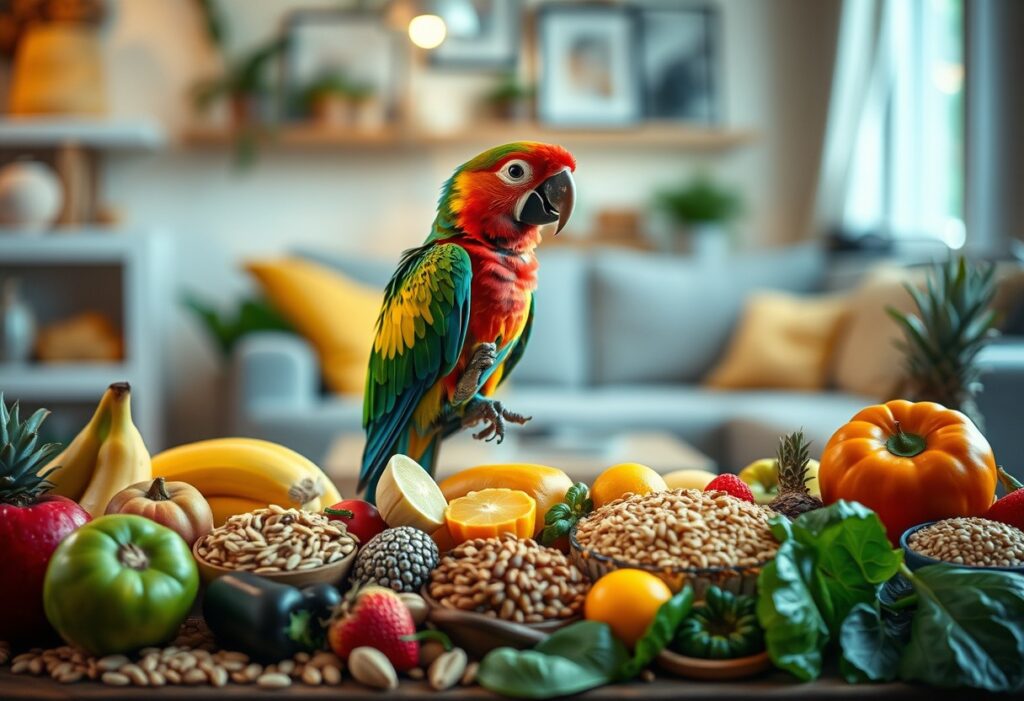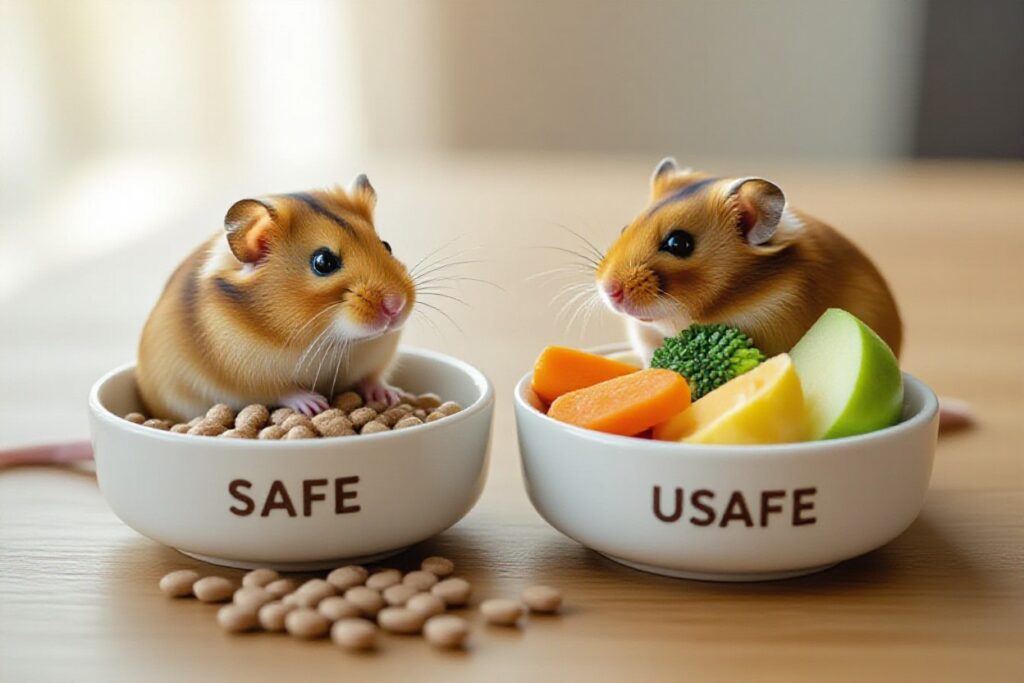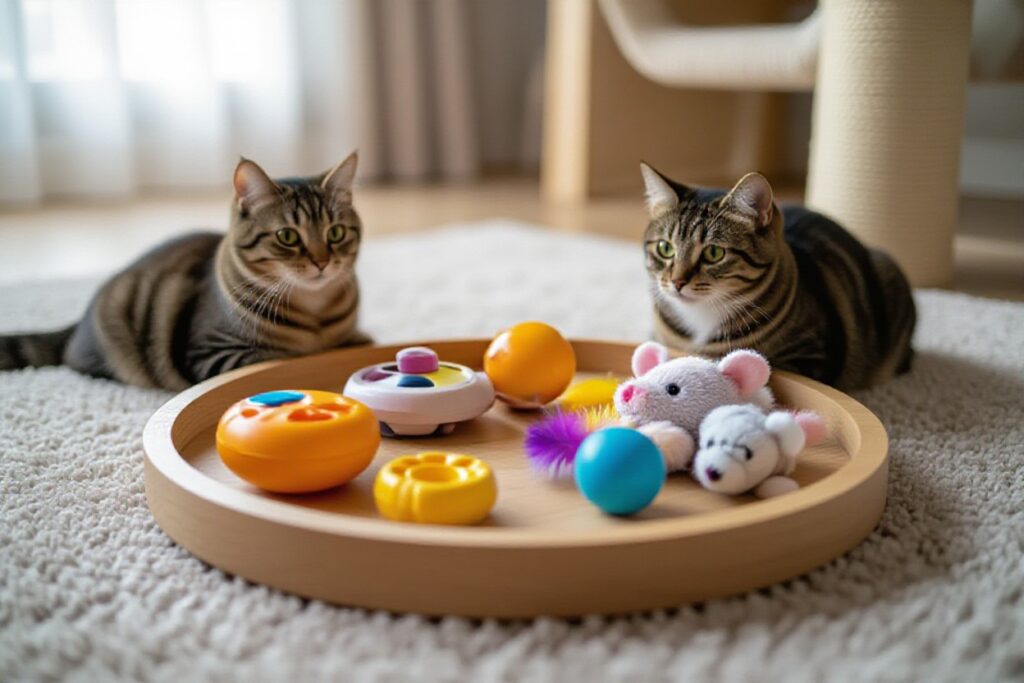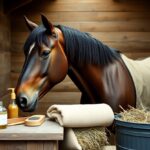Nutrition is vital for the health and happiness of your feathered friend. Understanding what to feed your bird can significantly affect its lifespan, energy levels, and overall well-being. In this ultimate guide, you’ll discover crucial nutrients, dangerous foods to avoid, and healthy treats that will keep your avian companion thriving. By the end of this post, you’ll have the knowledge needed to create a balanced diet tailored to your bird’s specific needs.
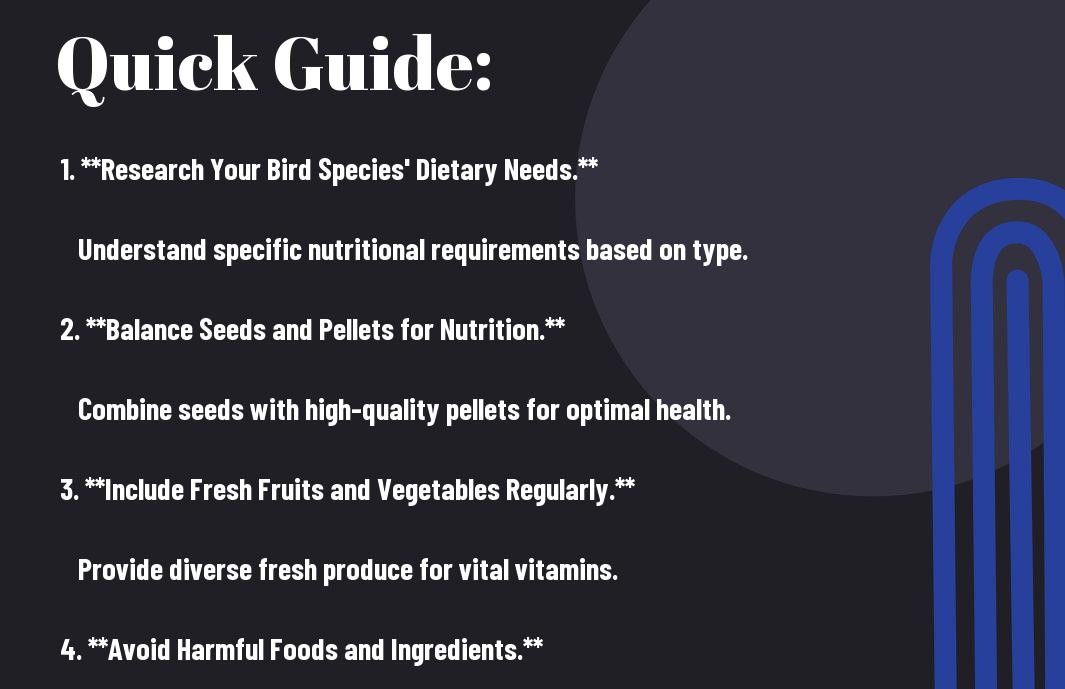
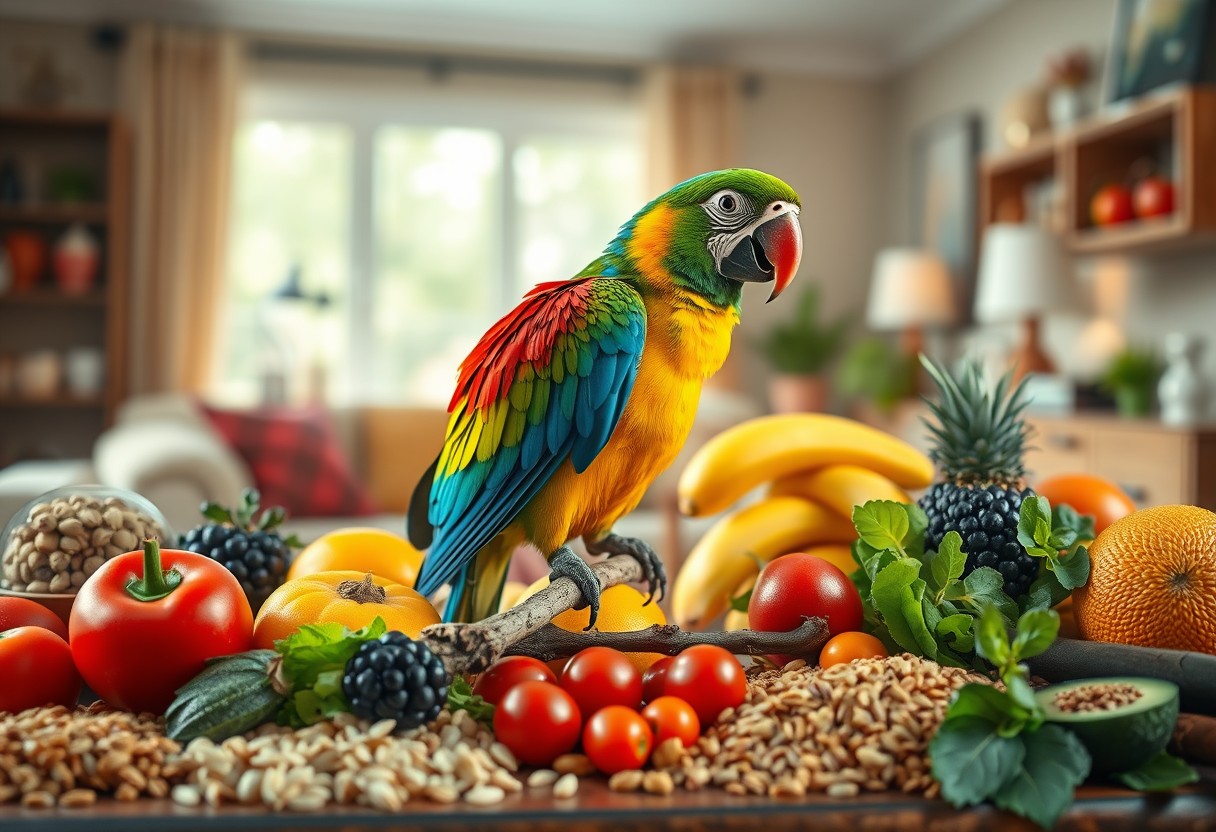
Types of Bird Food
Your feathered friend’s diet is crucial for their overall health and well-being. Understanding the different types of bird food can help you make the best choices for their nutritional needs. Below is a breakdown of the main types of bird food available:
| Type of Bird Food | Description |
|---|---|
| Seeds and Grains | Natural sources of energy, rich in fats. |
| Fruits and Vegetables | Provide vital vitamins and antioxidants. |
| Pelleted Diets | Formulated for balanced nutrition. |
| Protein Sources | Important for growth and maintenance. |
| Mixed Diets | Combination of various foods to ensure variety. |
Seeds and Grains
Little do many bird owners know that seeds and grains are a staple in a bird’s diet. These foods are packed with calories and are an excellent source of energy. Varieties such as sunflower seeds, millet, and oat flakes cater to different bird species and needs. However, it’s crucial to note that while seeds provide energy, they should not be the sole items in your bird’s diet, as they can lead to obesity and deficiencies in vital nutrients.
Choosing a variety of seeds can keep your bird entertained and mentally stimulated. It’s important to also ensure that seeds are fresh and of high quality to avoid potential health risks. A blend of seeds supplemented with other food types will help in maintaining your bird’s overall health and vitality.
Fruits and Vegetables
You should incorporate fresh fruits and vegetables into your bird’s diet to enhance their health and longevity. These natural foods provide numerous vitamins and minerals that are vital for your bird’s immune system and overall well-being. Common choices include leafy greens, carrots, apples, and berries. Always wash and cut them into manageable pieces for your bird to enjoy.
Food such as fruits and vegetables should account for a significant portion of your feathered friend’s daily intake. These foods not only supply hydration but also help in preventing serious health issues associated with a poor diet. The wide range of flavors and textures can also help keep your bird from becoming bored with their meals.
Pelleted Diets
On the other hand, pelleted diets offer a more scientific approach to bird nutrition. These diets are specifically formulated to provide all the vital nutrients your bird needs in a controlled and balanced manner. Pellets are considered to be easier for owners to manage, reducing the likelihood of picky eating and potential health issues that may arise from an unbalanced diet.
Another compelling benefit of pelleted diets is their convenience. They are easier to store and have a longer shelf life compared to fresh foods. However, it’s important to gradually introduce your bird to pellets, as they may initially refuse them in favor of their beloved seeds.
Protein Sources
Assuming you want to ensure your bird remains healthy, adding protein sources to their diet is vital. Foods like cooked eggs, legumes, and mealworms can supply the necessary protein that supports muscle development and overall health. Protein is especially important during breeding seasons and for young, growing birds.
The careful selection of protein sources can make a big difference in your bird’s vitality. Offering a variety not only balances their diet but also keeps mealtime exciting for your pet. Remember that while protein is vital, it should be offered in moderation to avoid health complications.
Perceiving the variety of food options available will help you tailor a nutritious diet for your bird, ensuring they thrive and stay vibrant throughout their life.
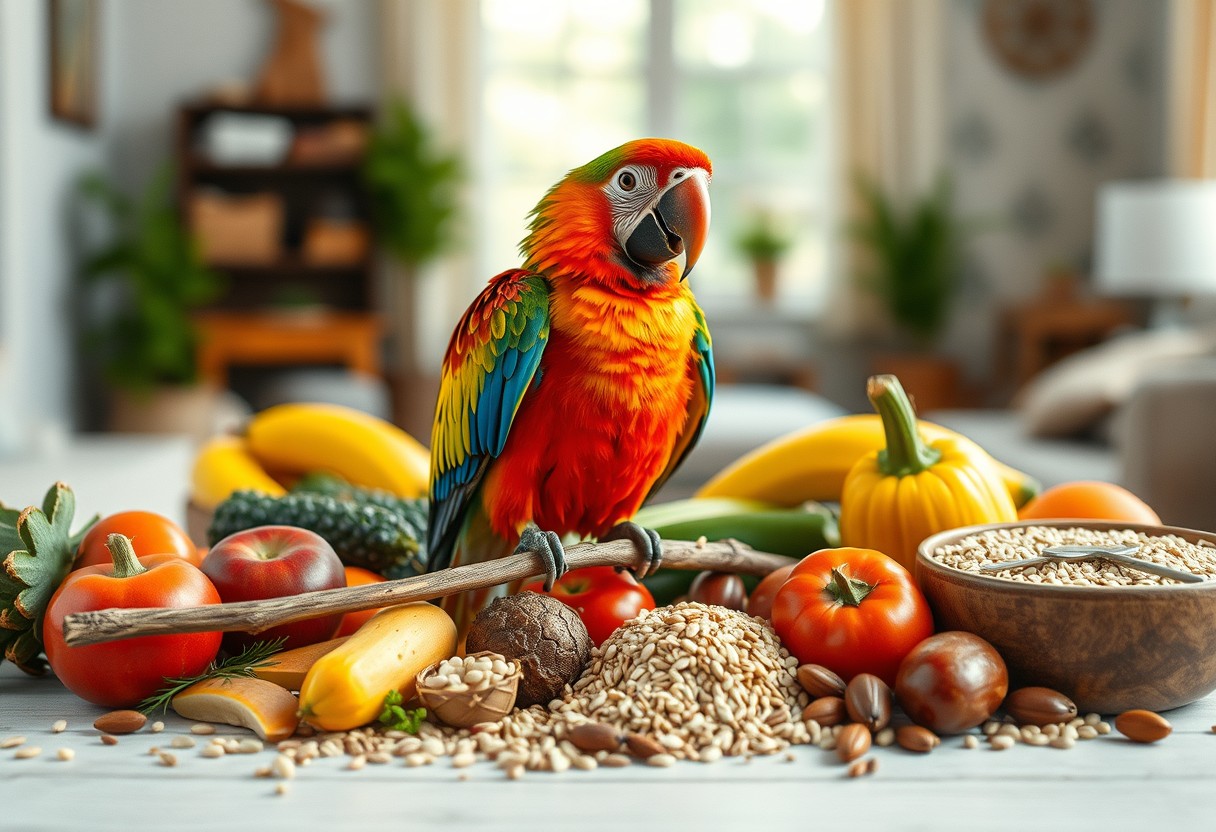
Tips for Providing Balanced Nutrition
You should focus on a well-rounded approach to ensure your feathered friend receives the appropriate nutrition it needs. Here are some crucial tips you can implement:
- Incorporate a variety of fruits and vegetables into their diet to provide necessary vitamins and minerals.
- Choose high-quality pelleted diets that are specifically formulated for your bird’s species.
- Limit the amount of seed mixes as they can be high in fat and low in crucial nutrients.
- Offer occasional treats like nuts, but in moderation to avoid obesity.
- Keep fresh water available at all times to ensure hydration.
Thou must ensure that your bird’s diet remains balanced and diverse to promote overall health and wellbeing.
Seasonal Feeding Considerations
Providing seasonal adjustments to your bird’s diet can significantly enhance their nutrition. During the warmer months, when fresh produce is plentiful, consider offering a wider range of fresh fruits and vegetables. Birds often enjoy seasonal treats like berries or leafy greens that contribute to a balanced diet. Conversely, in cooler months, you might need to rely more on dried or stored foods, ensuring these options remain high-quality and nutritionally balanced.
Additionally, keep an eye on your bird’s energy levels and activity. During molting or breeding seasons, their nutritional needs might shift, necessitating an increase in protein sources. Always research the best seasonal foods suitable for your particular species of bird to provide optimal nutrition.
Freshness and Quality of Food
Tips for ensuring high freshness and quality of food for your bird include checking expiration dates on packaged foods and being diligent about the state of fresh produce. Always store food in airtight containers to keep it fresh and prevent contamination. Further, swapping out any spoiled items promptly is crucial for maintaining a healthy diet. Your feathered friend relies on you for every aspect of their health, including the quality of their food.
Freshness is key to ensuring that your bird receives the best possible nutrition. Offering fresh, organic produce not only supports their health but can act as an engaging activity, sparking their natural foraging instincts which is crucial for their mental stimulation. Always wash fruits and veggies thoroughly to remove any pesticides or contaminants.
Avoiding Harmful Foods
Nutrition plays a critical role in your bird’s health, and this extends to avoiding certain harmful foods as well. Common items that can damage your bird’s digestive system include avocado, chocolate, caffeine, and alcohol. These foods can be toxic and should be completely eliminated from your bird’s diet. It’s also wise to be cautious about sharing human food, as many all-too-common ingredients can be detrimental to your feathered friend.
Foods that pose a risk to your bird’s wellbeing should always be kept out of their reach. Furthermore, be mindful of any dietary restrictions based on your bird’s specific species, as each type can have particular sensitivities and health concerns that require special attention.
Portion Control and Feeding Frequency
Feeding your bird the right portions and monitoring their feeding frequency is paramount in maintaining a healthy weight and ensuring their nutritional needs are met. Implementing a consistent schedule can help your bird develop healthy eating habits. Dividing their food into appropriate portions and offering them at regular intervals can prevent overeating and obesity, which are common concerns in pet birds.
Harmful consequences of overfeeding can include weight gain and related health issues, so you should observe your bird’s weight and adjust portions as necessary. Offering a mix of foods throughout the day can keep them engaged and satisfied without overindulgence.
Step-by-Step Guide to Meal Preparation
To ensure your feathered friend receives the best nutrition, it’s crucial to follow a systematic approach to meal preparation. This guide will walk you through the necessary steps to create the perfect diet for your avian companion.
Assessing Your Bird’s Dietary Needs
| Factors to Consider | Action Steps |
| Species of Bird | Research specific dietary requirements based on species. |
| Age | Adjust nutrition according to growth stages or maturity. |
| Health Conditions | Consult with an avian veterinarian for tailored advice. |
| Activity Level | Consider their exercise to determine calorie needs. |
Assessing Your Bird’s Dietary Needs
The first step in meal preparation is to thoroughly assess your bird’s dietary needs. Each species has its own nutritional requirements, and understanding these is vital. Factors such as age, health conditions, and activity levels can significantly influence what your bird should eat. Take the time to research and consult with an avian veterinarian to create a tailored diet plan.
Moreover, consider your bird’s natural diet in the wild. This will help you incorporate appropriate fruits, vegetables, seeds, and pellets that closely mirror what they would naturally consume. Pay close attention to any signs of dietary deficiencies or health issues, as these may indicate a need for dietary adjustments.
Creating a Balanced Meal Plan
An effective meal plan encompasses a variety of foods that provide vital nutrients to your pet bird. Begin by including high-quality pellets, which should make up a majority of your bird’s diet, then supplement with fresh fruits and vegetables. Speckle in seeds or nuts as occasional treats to keep meals interesting while ensuring they don’t contribute to unhealthy weight gain.
Essentially, your goal is to achieve a nutrient-rich diet that reflects your bird’s unique needs, tastes, and preferences. Balance is the key; too much of one food item can lead to health problems, so aim for diversity in food choices.
For instance, if you have a parakeet, consider incorporating leafy greens like kale, fibrous vegetables like carrots, and a small selection of fruits like berries into their meals. Additionally, always check for safe food options tailored to your bird species.
Preparing Fresh Foods
While fresh foods are vital for providing vital vitamins and minerals, proper preparation is required to maximize their benefits. Start by washing all fruits and vegetables thoroughly to remove any pesticides or dirt. It’s recommended to chop them into bite-sized pieces that are easy for your bird to handle and consume.
Furthermore, avoid cooking any vegetables that you offer to your bird, as this can strip away important nutrients. Instead, consider steaming them lightly to maintain their vitamin content. Always remember to offer a variety of fresh foods regularly to keep your bird engaged and healthy.
It’s vital to rotate different fruits and vegetables in their diet to expose them to various nutrients. Experimenting with colors and types of produce can also stimulate their curiosity while promoting a well-rounded intake of vital nutrients.
Storing Food Safely
Meal preparation doesn’t end with cooking; storing food safely is equally important. Always ensure that any fresh foods left over from meal prep are stored in airtight containers in the refrigerator to prevent spoilage. It’s also crucial to serve freshly prepared foods and discard any uneaten portions after a few hours to avoid bacterial growth.
Your goal should be to maintain maximal freshness while minimizing wastage. Regularly check for expired or spoiled items in your bird’s food supply, and replace them as necessary to keep your feathered friend healthy.
Your storage practices can directly impact the health and wellbeing of your bird. Implementing a systematic approach to food preparation, including safe storage practices, helps ensure that your avian companion enjoys a diet that is not only balanced but also safe for consumption.
Factors Influencing Bird Nutrition
For every bird owner, understanding the various factors influencing your feathered friend’s nutrition is crucial. Different parameters, including species-specific needs, age, health considerations, and environmental factors, all play a significant role in determining a suitable diet for your avian companion. To ensure you’re providing the best care, consider the following aspects:
- Species – Different birds have unique dietary requirements.
- Age – Nutritional needs change as birds mature.
- Health – Illnesses can alter dietary requirements drastically.
- Environment – Factors like climate and living conditions affect nutritional needs.
Thou must prioritize these factors to maintain your feathered friend’s health and vitality.
Species-Specific Requirements
Requirements of birds can vary considerably from one species to another. For instance, seed-eating birds, such as finches and canaries, have different nutritional needs compared to nectarivores like hummingbirds. While some birds thrive on a diet primarily consisting of seeds, others need fruits, vegetables, or even insects to maintain a balanced nutritional intake. It is vital to identify your bird’s specific species and research its dietary needs in detail.
Moreover, even within a species, individual preferences and nutritional needs can differ based on genetic factors or personal habits. Therefore, making adjustments and offering a variety of food items is crucial for ensuring that your pet bird receives a holistic diet, which caters to their unique requirements.
Age and Health Considerations
For every stage of your bird’s life, nutritional needs can shift dramatically. Young birds may require a diet higher in protein to support rapid growth, while older, sedentary birds may need a lower calorie intake to prevent obesity. Similarly, birds that are breeding or in laying season benefit from additional nutrients as they go through heightened metabolic demands.
In the context of health, it’s critical to consult with an avian veterinarian to determine the correct dietary adjustments. Health issues can lead to a range of problems, such as metabolic diseases or digestive disorders, making it vital for you to tailor your bird’s diet accordingly.
It is vital to be aware that any underlying health conditions can require specialized diets, and regular monitoring will help you set appropriate dietary limits and ensure your bird remains healthy.
Environmental Factors
Influencing your bird’s nutrition are the environmental factors where they live and thrive. A bird’s diet may need to reflect the living conditions, such as temperature and humidity levels, keeping in mind that certain foods remain fresh longer than others. If your home is warm and dry, you may notice that some fruits and veggies spoil quicker, which could lead to a lack of variety.
Additionally, exposure to sunlight can help synthesize vital nutrients. Birds living in bright environments might need fewer sources of certain vitamins. On contrast, birds kept in dimly lit conditions may require supplements to compensate for insufficient exposure to natural light.
- Climate – Seasonal changes can affect food availability.
- Living Conditions – Ensure a stimulating environment for balanced nutrition.
- Food Spoilage – Managing food quality is crucial.
Thou should pay close attention to the environmental aspects that influence your bird’s health and nutrition.
Health cases of your feathered friend can be particularly vulnerable to environmental factors like pollutants and inconsistent temperatures. Make a concerted effort to provide clean air and a stable temperature to encourage proper digestion and nutrient absorption, as unfavorable conditions can compromise your bird’s health.
- Pollution – Avoid exposing your bird to harmful substances.
- Temperature – Maintain a stable, comfortable climate.
- Hygiene – Regular cleaning of their environment is vital.
Thou must create a safe and nurturing habitat to provide the best conditions for your bird’s well-being.
Behavioral Needs
One of the often-overlooked factors in avian nutrition is your bird’s behavioral needs. Birds are social creatures that require stimulation to mimic their natural habitat. The lack of proper engagement can lead them to an unhealthy relationship with food, often resulting in overeating or picky eating behaviors. For instance, if a bird is not properly stimulated, it may resort to munching on whatever is available, leading it to miss out on vital nutrients.
While providing nutritious food is vital, enhancing your bird’s environment with toys and interactions can significantly improve their overall eating habits. Factors such as boredom can lead to stress, which may manifest in various health issues, underscoring the importance of a well-rounded approach to your bird’s nutrition.
Factors impacting your bird’s behavior include mental stimulation, socialization, and interaction opportunities. Incorporating a mix of foraging toys and interactive play not only promotes their mental health but also encourages a varied diet, which ensures they are meeting their nutritional needs.
Pros and Cons of Different Diets
After considering the different dietary options for your feathered friend, it’s important to assess the pros and cons of each diet type to ensure you provide the best nutrition possible. Below is a summary of the advantages and disadvantages of various bird diets:
Pros and Cons of Different Diets
| Diet Type | Pros | Cons |
|---|---|---|
| Seed-Based Diets | Tasty and enjoyable for most birds | Can lead to obesity and malnutrition |
| Fruit and Veggie Diets | Rich in vitamins and antioxidants | High sugar content can be harmful |
| Pelleted Diets | Balanced and nutritionally complete | Some birds may resist them |
| Homemade Diets | Customizable and fresh | Risk of nutrient imbalance |
| Nut-Based Diets | High in healthy fats | Very calorie-dense; risk of obesity |
| Insect-Based Diets | High in protein for some species | Not suitable for all bird types |
| Grain-Based Diets | Good energy source | Low in necessary vitamins and minerals |
Advantages of Seed-Based Diets
On one hand, seed-based diets are favored by many bird owners because they are palatable and provide a sense of enjoyment for your feathered friends. The variety of seeds available allows you to offer a range of flavors and textures that can keep your bird engaged and happy. Additionally, some seeds contain necessary fatty acids that are beneficial for skin and feather health.
However, while seeds can be a delightful component of your bird’s diet, they often lack certain vital nutrients. You should offer seeds as part of a more balanced diet instead of the sole component. Mixing seeds with other food types ensures that your bird receives all necessary nutrients, avoiding potential health issues associated with excessive seed consumption.
Disadvantages of Excessive Fruit
You might be tempted to spoil your bird with an assortment of fruits, but it’s important to recognize the risks associated with excessive fruit consumption. While fruits are an excellent source of vitamins, they often contain high levels of natural sugars. This can lead to obesity and other metabolic issues, particularly in birds that are already prone to weight gain.
Furthermore, a diet solely composed of fruits does not provide the complete nutrition your bird needs. A balanced diet should include other food sources, so your bird receives a well-rounded intake of nutrients. Aim for a variety that includes seeds, pellets, and vegetables alongside fruits for optimal health.
For instance, birds that are primarily fed fruit may begin to show signs of nutrient deficiencies over time, leading to health problems like liver disease or feather plucking. It’s necessary to keep track of your bird’s diet and ensure a proper balance of food types to mitigate these risks.
Benefits of Pelleted Diets
Even though your first instinct might be to stick to seeds or fruits, pelleted diets offer numerous benefits that can enhance your bird’s health. These diets are typically formulated to be nutritionally complete, containing the right balance of vitamins, minerals, and other nutrients necessary for your bird’s wellbeing. Many avian veterinarians recommend pellets as a primary food source because they can help prevent obesity and malnutrition.
Additionally, pellets eliminate the selective eating habits that birds may develop when offered seeds, as they tend to pick out their favorites and leave behind less desirable options. By providing a pelleted diet, you can ensure your bird receives all the necessary nutrients in each meal, promoting long-term health and vitality.
Fruit can certainly be included in a pelleted diet as a treat, but the base of their diet should rely on pellets for comprehensive nutrition.
Risks of Homemade Diets
To provide your bird with the best care, it might be tempting to prepare homemade diets. However, this approach comes with its own set of risks. Homemade diets can often lack crucial nutrients that commercially prepared diets provide. Balancing ingredients to meet your bird’s nutritional requirements can be challenging, leading to accidental deficiencies or imbalances that can have grave health implications.
Moreover, unless you have a strong knowledge of avian nutrition, you may inadvertently include ingredients that could be harmful to your bird. For instance, certain foods that are safe for humans can be toxic to birds, such as chocolate, avocado, or caffeine. It’s critical to do thorough research or consult an avian veterinarian before attempting to create a homemade diet for your feathered companion.
With the complexity of avian dietary needs, consider consulting a specialist or avian veterinarian who can help guide you in creating a balanced homemade diet. This can ensure that your bird receives necessary nutrients while avoiding potentially dangerous ingredients.
Conclusion
Now that you have a comprehensive understanding of bird nutrition, it’s clear that providing a balanced diet is crucial for the health and well-being of your feathered friend. By incorporating a mix of high-quality seeds, fresh fruits, vegetables, and pellets into your bird’s daily meals, you can ensure that they receive the crucial nutrients necessary to thrive. Remember to pay attention to the specific dietary needs of your bird species, as these can vary significantly. Regular vet check-ups and consultations can help you adjust their diet as needed and keep your bird in peak condition.
To summarize, being attentive to your bird’s nutrition is a rewarding endeavor that fosters a longer, healthier life for your pet. With the right knowledge and commitment, you can transform mealtime into a beneficial and enjoyable experience for both of you. Always strive to educate yourself further and adapt your bird’s diet based on their changing needs, preferences, and health requirements. Your dedication to their nutrition is a vital part of being a responsible bird owner.
FAQ
Q: Why is bird nutrition important for my pet’s health?
A: Bird nutrition is crucial for maintaining your pet’s overall health, longevity, and quality of life. A well-balanced diet ensures that your feathered friend receives important vitamins, minerals, and nutrients needed to support their immune system, feather development, and organ function. Poor nutrition can lead to various health issues, including obesity, feather plucking, and a weakened immune system. Providing a proper diet tailored to the specific needs of your bird species is vital for their well-being.
Q: What types of food should I include in my bird’s diet?
A: A balanced diet for birds generally includes a variety of seeds, pellets, fruits, vegetables, and occasional protein sources. High-quality pellets should make up a significant portion of their diet, as they contain important nutrients required for health. Fresh fruits and vegetables are important for providing vitamins and hydration; however, certain foods like avocado, chocolate, and caffeine are toxic to birds and should be avoided. Always research specific dietary needs for your bird species, as some may require more variety or specific nutrients than others.
Q: How often should I feed my bird and are there portion control guidelines?
A: Feeding frequency and portion sizes for your bird depend on their species, age, and activity level. Generally, birds benefit from having access to fresh food daily. It’s recommended to provide commercially prepared pellets along with fresh fruits and vegetables in their diet each day. For portion control, the serving size should be adjusted based on the bird’s size; a good rule of thumb is to offer a quarter to a half cup of pellets, along with a small portion of fresh produce. Monitor your bird’s weight and health regularly, and adjust their diet as needed to prevent obesity and ensure they are getting the right amount of nutrition.
